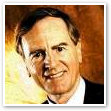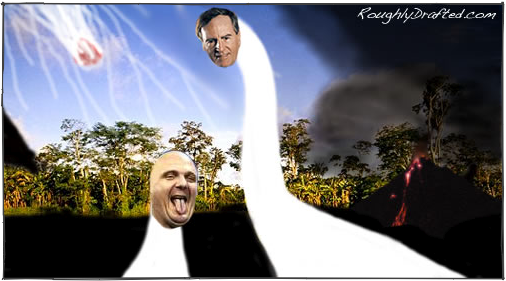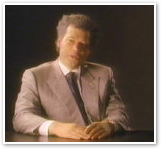
Platform Crisis: The Lazy Dinosaur 4
Sculley’s Legacy
Apple was in such a comfortable position when the 90’s started that it failed to plan for the future as if survival was at stake. John Sculley, who had run Apple since 1983, seemed to think he was still in charge of selling cans of soda at Pepsi.
 Apple under Sculley had raised the price of the original Mac to pay for an expensive advertising campaign, then later split up the Mac brand into different but overlapping subcategory brands: Quadra, Centris, and Performa. The move confused consumers, increased production costs, and lowered profits.
Apple under Sculley had raised the price of the original Mac to pay for an expensive advertising campaign, then later split up the Mac brand into different but overlapping subcategory brands: Quadra, Centris, and Performa. The move confused consumers, increased production costs, and lowered profits.In general, Sculley's Apple consistently produced ambitious but unrealistic technology plans that attempted to over-achieve at a price that failed to capture a sustainable segment of the market. The number of Macs being sold remained fairly stagnant, while the PC market was expanding rapidly into new areas.
Sculley, foreshadowing his fellow Republican Carly Fiorina at HP, became involved in promoting his own political career than the affairs at Apple. Sculley had set Apple to autopilot and was chatting up the flight attendants just as the company was flying into dark storm clouds.
Scrambling For Straws
With Mac sales stagnant and its CEO out campaigning for Bill Clinton, Apple's board decided to remove Sculley. He was replaced by Michael Spindler, a product of the same old Apple. Spindler was responsible for many of the questionable decisions Sculley had put in place, including the confusing Mac sub-branding initiative.
Spindler was a strategic marketer with little technical vision. He hoped to sell Apple off to the highest bidder before the very real problems at the company were revealed. To do that, he largely maintained the status quo, presiding over events already placed in motion.
Under Sculley, Spindler had been unable to make any meaningful cuts because all of the unworkable projects at Apple were pet projects Sculley defended.
After Sculley’s ouster in 1993, Spindler’s attempts to make cuts were poorly received by the engineers and managers comfortable with the way things were, so Spindler's Apple floated the results of various projects Sculley had approved for launch:
-
•the various development efforts that were fated to go nowhere, including PowerTalk and QuickDraw GX.
Failed Strategies
While incorporating impressive technology, the Newton was not a successful product because it failed to balance price and utility. It did a lot, but also cost too much. Prior to the Newton, Apple originated another PDA project that was spun off as General Magic, but rather than being complementary, the two efforts litigated and competed against each other, speeding the demise of both.
Jean Louis Gassée’s opposition to Mac licensing and his premium pricing strategies of the late 80’s had worked to limit the potential for Mac growth in the critical period before Microsoft's Windows PC began to offer significant competition.
Now that Gassée was gone, recovery would be far more complicated that just reversing the policies he had established. Efforts to license hardware designs for the Pippin and other cloners would not work out as planned, particularly after Windows 95 became available.
Further, the cheaper Macs that Apple was now trying to blow out into the market in a desperate bid for more market share were actually just clogging the pipeline, because there was no reliable sales force to sell them, and no advertising campaign to explain why anyone should buy them.
This Article
This Series










Wednesday, November 29, 2006



 Bookmark on Del.icio.us
Bookmark on Del.icio.us Discuss on Reddit
Discuss on Reddit Critically review on NewsTrust
Critically review on NewsTrust Forward to Friends
Forward to Friends
 Get RSS Feed
Get RSS Feed Download RSS Widget
Download RSS Widget





